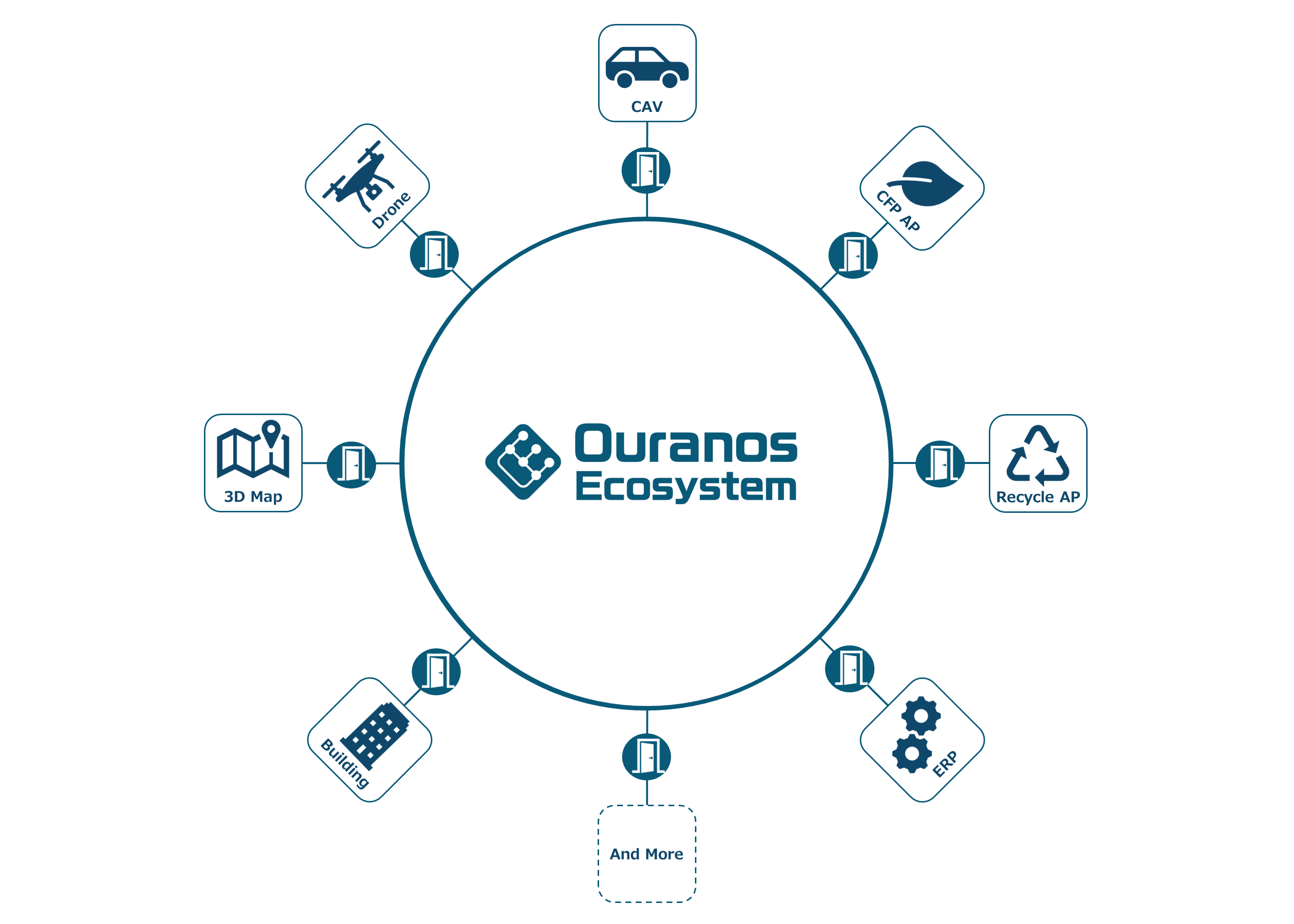- Home
- News Releases
- Back Issues
- April FY2023
- Japan’s Initiatives for Interoperable Data Infrastructures Officially Named “Ouranos Ecosystem”
Japan’s Initiatives for Interoperable Data Infrastructures Officially Named “Ouranos Ecosystem”
April 29, 2023
The Ministry of Economy, Trade and Industry (METI) has decided on the official name of the initiatives for enabling enterprises and industries to share and utilize data in addressing societal issues.
The Ministry of Economy, Trade and Industry (METI), together with the related ministries and agency, the Digital Architecture Design Center (DADC) under the Information Processing Promotion Agency (IPA), and the New Energy and Industrial Technology Development Organization (NEDO), has been working on designing, researching and developing, demonstrating, implementing, and disseminating architecture of mechanisms for sharing multiple data processing systems operated and managed by various stakeholders. METI hereby announces that we have named these initiatives for interoperable data infrastructures “Ouranos Ecosystem.”

1. Background
In pursuit of achieving “Society 5.0”, Japan has been actively promoting the development of “Connected Industries” that facilitate the creation of new added value and solutions to societal challenges through interconnectedness. Consequently, the sharing and utilization of data among enterprises is gradually gaining traction. Meanwhile, however, to effectively tackle societal issues such as decarbonization, labor shortages and intensifying natural disasters, or economic growth through changes in industrial structures, it is crucial to establish mechanisms for sharing and utilizing data across the borders between enterprises and industries, and national boundaries. Looking at overseas, Europe has initiated endeavors such as Gaia-X and Catena-X to secure data sovereignty, ensure interoperability among digital platforms, and promote open-source code, while securely linking data through a federated infrastructure. In the United States, data-sharing services offered by mega-platforms are becoming increasingly prevalent, alongside the progress made in adopting innovative technologies exemplified by blockchain.
2. Leading Initiatives for Interoperable Data Infrastructures (IDIs)
Against this backdrop, the DADC was established under the IPA in May 2020. In pursuit of realizing “Society 5.0”, experts from industry, academia and government have joined forces to launch projects aimed at creating a data-sharing ecosystem. The team has commenced pioneering work in two fields related to digital transformation (DX): passenger and freight transport as well as commercial distribution and money flow.
The DX project for passenger and freight transport aims to solve societal challenges, such as crises in passenger and freight transport associated with labor shortages and intensifying natural disasters, thereby developing new industries. It is therefore important to establish a system that optimizes the movement of passengers and freight cargo through the utilization of autonomous mobility robots, such as CAV (Connected Autonomous Vehicles), UAM (Urban Air Mobility) and service robots to meet the demands in a safe and economical way. To this end, METI has been advancing initiatives for establishing the “4D Spatiotemporal Data Exchange Infrastructure” which serves as a digital twin, replicating the operating environment in a virtual space, in order to ensure the safe and efficient operation of mobility systems that optimize the flow of passengers and freight cargo.
In the field of DX for commercial distribution and money flows, digitalizing the entire transaction process, from contracting to settlement, enables seamless data linkage in alignment with the architecture, contributing to enhancing and optimizing the entire global supply chain while addressing societal issues, including carbon neutrality, economic security, reduction of food loss, and establishing traceability. Moreover, these initiatives empower small and medium-sized enterprises (SMEs), startups and a variety of stakeholders to help industries to expand. To this end, METI has been advancing initiatives for establishing the “Supply Chain Data Exchange Infrastructure,” taking the storage battery and automobile industries as the leading examples.
The guidelines for the “4-dimensional Spatiotemporal Data Exchange Infrastructure” and the “Supply Chain Data Exchange Infrastructure” are set to be effective, with open-source software (OSS) becoming available in FY2023. Furthermore, we aim at launching a Public Interests Digital Platform―to be operated collaboratively by industrial players for public interests— which utilizes these guidelines and OSS in FY2024. The objective is to facilitate the capacity of private enterprises to address social issues and deliver customer-oriented solutions by providing services through this Public Interests Digital Platform. To expedite the widespread adoption of these benefits from digitalization across society, Japan has formulated and implemented the “Digital Lifeline Development Plan”.
3. Naming
In carrying out these initiatives for IDIs, it is vital to encourage the participation of a wide variety of domestic enterprises and ensure international interoperability to prevent de-facto isolation of ecosystems, or unconnected silos.
With the upcoming launch in the next fiscal year and with the aim of raising public awareness both domestically and internationally, we have decided to collectively name these initiatives “Ouranos Ecosystem”. This comprehensive framework encompasses the architectural design, research and development, demonstration, implementation, and dissemination of mechanisms for sharing and utilizing data across borders between enterprises and industries, and national boundaries, in collaboration with industry, academia, and government. The term “Ouranos” is derived from Greek mythology, as the God of the sky and the heavens. It represents an ecosystem where various stakeholders come together to create new value by optimally linking systems from a holistic perspective.

Link to related information
Division in Charge
Digital Economy Division, Commerce and Information Policy Bureau